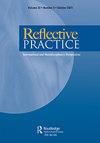Reflective thinking in higher education: examining practices of higher education faculty
IF 1.6
Q2 EDUCATION & EDUCATIONAL RESEARCH
引用次数: 1
Abstract
ABSTRACT A reflective teacher thinking paradigm usually might shape the teaching practices of professionals, especially in learner-centered educational environments. This study aims to reveal reflective thinking and reflective practices of qualified faculty in higher education institutions in more than twenty countries. To do that, 257 responses to a 5-point scale questionnaire from volunteer university faculty were analyzed. The relationship between reflective thinking and other components of the questionnaire is also presented in the study. The results provide evidence that reflective thinking is not a stand-alone attribute, and it works together with other abilities such as self-assessment, teaching awareness, and self-efficacy. The responses of the faculty were also examined and discussed. Based on the results, most of them have an interest in self-discovery and awareness on what they teach, assess their performance, and value feedback although the scores present a low performance on reflective thinking individually.反思性思维在高等教育中的应用——对高等教育师资实践的考察
摘要反思性教师思维范式通常会影响专业人员的教学实践,尤其是在以学习者为中心的教育环境中。本研究旨在揭示20多个国家高等教育机构合格教师的反思思维和反思实践。为此,对257份来自志愿大学教师的5分制问卷进行了分析。研究中还介绍了反思思维与问卷其他组成部分之间的关系。研究结果证明,反思思维不是一个独立的属性,它与自我评估、教学意识和自我效能等其他能力协同作用。还对教员的反应进行了审查和讨论。根据研究结果,他们中的大多数人对自我发现和对所教内容的认识感兴趣,评估自己的表现,并重视反馈,尽管这些分数在个人反思思维方面表现不佳。
本文章由计算机程序翻译,如有差异,请以英文原文为准。
求助全文
约1分钟内获得全文
求助全文

 求助内容:
求助内容: 应助结果提醒方式:
应助结果提醒方式:


